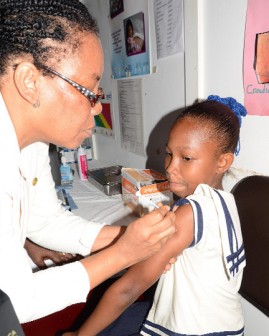The HPV vaccine was yesterday launched at the East La Penitence Health Centre as part of cervical cancer awareness month and it is being promoted as increasing life expectancy among females.
Health Minister Dr Bheri Ramsaran, Director of Regional Health Services Dr Narine Singh; PAHO Representative Dr Beverly Barnett; Director, Maternal and Child Health Dr Janice Woolford; Director of Adolescent Health Dr Marcia Paltoo and Zeta Alberts welcomed the programme in the presence of students of the East La Penitence Primary School.
The Ministry of Health has designated January as cervical cancer awareness and prevention month under the theme ‘Early detection, save lives’. The campaign is aimed at raising public awareness of the illness and its dangers so that Guyanese women can be more enlightened and be able to take action.

According to Singh, Guyana has one of the highest cervical cancer incidents and mortality rates in the western hemisphere and considered it to be a major public health problem locally.
“Every year we see 80-100 women dying of cervical cancer in Guyana… Fact is that cervical cancer is preventable. We know now that cervical cancer is caused by a virus transmitted through sexual activity… and this virus can be prevented,” he noted.
Sharing this point of view was Dr Barnett who reiterated that cervical cancer is preventable and that it is one of the few cancers that we know can be prevented. “Notwithstanding, worldwide it is the second most common cancer in women. Each year it affects 500,000 women and causes 260,000 deaths. Screening by Pap smear or VIA aims to detect pre-cancerous lesions in the cervix and treat them, so that the cancer doesn’t develop,” she noted.
Barnett explained that HPV is transmitted mainly through sexual contact and noted that prevention methods include abstinence, safe sex and having a long-term, mutually monogamous relationship with an uninfected partner.
She admitted that it is true that most HPV infections are benign and clear within 2 years without specific treatment. However, she pointed out, many people with HPV infections have no symptoms or signs, and 10% of women with HPV do not get rid of the disease, they instead develop persistent infection.
“If the infection is due the high-risk HPV types, they are at increased risk of developing cervical cancer, especially if there are other factors that may contribute to increased risk, such as smoking, multi-parity, nutritional deficiencies, prolonged oral contraceptive use, other STIs, or genetic factors,” she said.
Meanwhile, Woolford pointed out that the cost effectiveness of the treatment was reviewed in its implementation and it has been proven that it would be economically less in terms of a long-term investment in health care.
“Since November 2001, the EPI programme in Guyana, spearheaded by the Ministry of Health has been sharing information and having discussions with the Ministry of Education, parents and guardians of the targeted schools to receive HPV. The targeted estimated for young girls was roughly over 6,900 young females,” she noted.
She said that the vaccination is expected to decrease the incidents of genital warts and pre-cancer changes in the cervix of a female. The vaccine, she said, works by building up the immune system to fight infection and is safe and licensed for young girls, aged 11-13 years, and has been approved by the US Food and Drug Administration.
Voluntary
Woolford indicated that a voluntary programme with girls 11 years of age in regions three, four, five and six, will be introduced. “We initially chose these regions because of the high density population… and because of the availability of the vaccine but as the programme expands, we will cover all regions, from 1-10,” she stated.
Also, Woolford noted that a mother/daughter package will soon be implemented which will offer mothers the opportunity of screening for cervical cancer while their daughters can enter the HPV programme.
Ramsaran, also addressing those in attendance, said that the ministry of health is launching this new vaccine against “the background of a strong vaccination programme… that has been in operation for several decades”.
“The Ministry of Health has significant experience and successes in the vaccine programme,” he pointed out.
Ramsaran stated that this is an expensive initiative taken on by the ministry. “It is a costly venture and in the atmosphere and environment where there are contracting budget, especially from international agencies for our health programmes, it must be seen as a bold step. One shot can cost as much as US$14, making it among the more expensive vaccines in our programme,” he stated.
In the United Kingdom, he noted, there are strong regulatory bodies that control the introduction and use of any medicine and health activities such as the HPV vaccine. “You have strong support from what is called the Medicine and Health Regulatory Authority,” he said.
Ramsaran said that most concerns raised by the public have already been investigated by PAHO and WHO, and authoritative sources worldwide have addressed these issues.
“Queries will arise in any medical intervention. They will all have their pros and cons. They have totally investigated some of those concerns,” he added.
He explained that the public must be prepared before the Ministry of Health undertakes an intervention and in this instance, the child and parent served as the public. As a result, extensive work was said to have been done with these parties.
Scientist and Public Health Professional, Sherlina Nageer, MPH, in a letter to Stabroek News dated January 9, 2012, questioned the delivery of information to the children and parents/guardians, whose decision it was to have this vaccine implemented and why.
She had pointed out that research is still ongoing and that some serious side effects have been observed. However, Ramsaran dismissed these claims.









